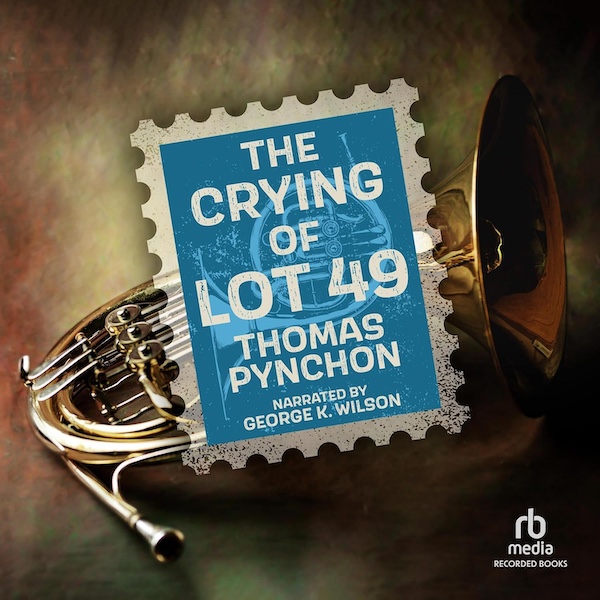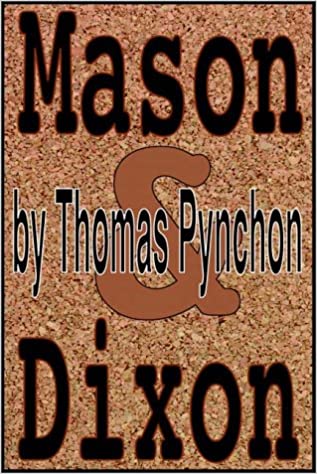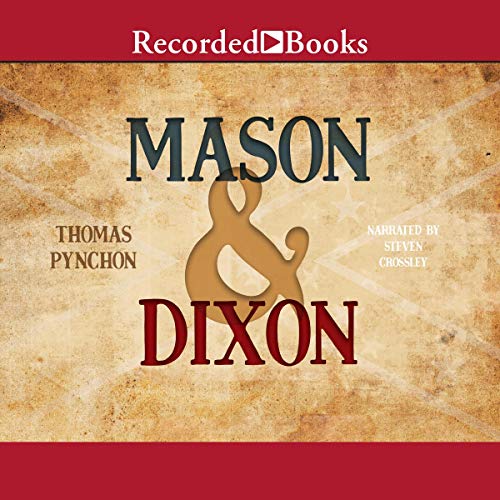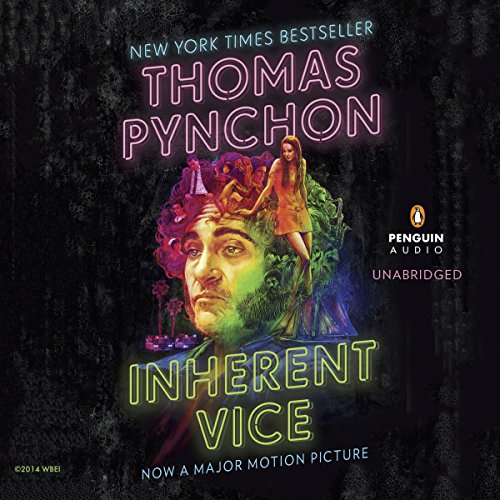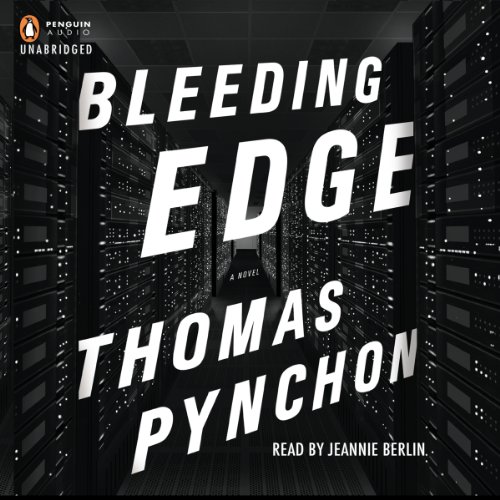Pynchon Audiobooks
- At January 29, 2021
- By Spermatikos Logos
- In Pynchon, The Modern Word
 0
0
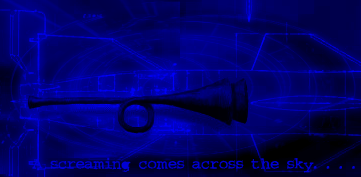
Pynchon Audio: Audiobooks
This section profiles Pynchon on audiobook, from old-school “books on tape” to digital audiobook. Clicking the cover images takes you to Amazon/Audible, where you can hear samples and purchase the audiobooks. Spermatikos Logos hopes to have more detailed reviews of these audiobooks online; please contact us if you’d like to lend a hand!
The Crying of Lot 49 (Audible)
Read by George Wilson
Unabridged; 6 hours, 14 minutes
Unabridged; 6 hours, 14 minutes
Publisher’s summary: Oedipa Maas discovers that she has been made executor of a former lover’s estate. The performance of her duties sets her on a strange trail of detection, in which bizarre characters crowd in to help or confuse her. But gradually, death, drugs, madness, and marriage combine to leave Oepida in isolation on the threshold of revelation, awaiting The Crying of Lot 49.
Gravity’s Rainbow (Audible)
Read by George Guidall
Unabridged; 37 hours, 21 minutes
Unabridged; 37 hours, 21 minutes
Publisher’s Summary: Winner of the 1973 National Book Award, Gravity’s Rainbow is a postmodern epic, a work as exhaustively significant to the second half of the 20th century as Joyce’s Ulysses was to the first. Its sprawling, encyclopedic narrative and penetrating analysis of the impact of technology on society make it an intellectual tour de force.
Die Enden der Parabel (Audible)
Read by
Abridged; 13 hours, 32 minutes
Abridged; 13 hours, 32 minutes
Publisher’s summary: Das Leben als Parabel. Parabelförmig ist die Flugbahn zwischen zwei Punkten, ist die Flugbahn der deutschen V-Waffen im Zweiten Weltkrieg, deren Entwicklung und Einsatz nur einen der zahllosen Handlungsstränge dieses Pandämoniums darstellen. Eine der Hauptfiguren ist der GI Tyrone Slothorp, der eine Erektion bekommt, bevor eine V2-Rakete einschlägt. Als lebendiges Frühwarnsystem ist er nicht nur für die Alliierten interessant. Der britische Officer Pirate Prentice und die holländische Doppelagentin Katje suchen mit Slothorp in einer wilden Verfolgungsjagd nach dem Geheimnis seiner Konditionierung. Sie reisen durch ein vom Krieg zerstörtes Deutschland in dem Anarchie und Paranoia herrschen. Thomas Pynchons großer Roman ist bereits zu einem Mythos der modernen Literatur geworden. Bearbeitet und inszeniert vom ausgezeichneten Hörspiel-Regisseur Klaus Buhlert ist ein wahres akustisches Kunstwerk entstanden. Prominente Sprecher wie Bibiana Beglau, Felix Goeser, Franz Pätzold, Corinna Harfouch, Wolfram Koch, Jens Harzer oder Manfred Zapatka zählen zum knapp 40-köpfigen Ensemble.
Translated into English:
Life as a parabola. The trajectory between two points is parabolic, as is the trajectory of the German V-weapons in World War II, the development and use of which are just one of the countless storylines in this literary pandemonium. Among the main characters is the American GI Tyrone Slothorp, who gets an erection before a V2 rocket hits. As a living early warning system, he’s not only of interest to the Allies. British officer Pirate Prentice and Dutch double-agent Katje embark on a wild goose chase with Slothorp to find the secret of his conditioning. They travel through a war-torn Germany in which anarchy and paranoia reign.Thomas Pynchon’s great novel has already become a legend in modern literature. Edited and staged by the award-winning radio play director Klaus Buhlert, a true work of acoustic art was created. Nearing forty people, the ensemble cast features prominent narrators such as Bibiana Beglau, Felix Goeser, Franz Pätzold, Corinna Harfouch, Wolfram Koch, Jens Harzer and Manfred Zapatka.
Vineland (Audible)
Read by Graham Winton
Unabridged; 15 hours, 27 minutes
Unabridged; 15 hours, 27 minutes
Publisher’s summary: Vineland, a zone of blessed anarchy in Northern California, is the last refuge of hippiedom, a culture devastated by the sobriety epidemic, Reaganomics, and the Tube. Here, in an Orwellian 1984, Zoyd Wheeler and his daughter, Prairie, search for Prairie’s long-lost mother, a ‘60s radical who ran off with a narc. Vineland is vintage Pynchon, full of quasi-allegorical characters, elaborate unresolved subplots, corny songs (“Floozy with an Uzi”), movie spoofs (Pee-wee Herman in The Robert Musil Story), and illicit sex (including a macho variation on the infamous sports car scene in V.).
Mason & Dixon (Books on Tape)
Mason & Dixon
Books on Tape, Catalog #4454
Read by Jonathan Reese
Unabridged; 20 90-minute cassettes
Books on Tape, Catalog #4454
Read by Jonathan Reese
Unabridged; 20 90-minute cassettes
Michael Gurnow furnished this review for Spermatikos Logos in 1997:
I originally rented the unabridged audio book to see if I have the patience for Pynchon’s latest work, knowing my threshold for the Hamster varied upon which work I was currently confronting at the time. I anticipated problems with the work due to the style and narrative voice in which it was composed, so I cut to the chase and decided to dip my toe in the water of M&D before jumping in headfirst. I opened the tome to page one as I hit play.
As much as the audio reading helps the reader to avoid getting tangled up in the archaic diction of the 18th century narration, Jonathan Reese does justice to the work insofar as he maintains a consistent pace throughout the reading (though this shouldn’t be posed as a possible area of contention when listening to an audio book, one must keep in mind just who Reese is having to represent). The downfall of the reading lies in that Reese, though understandably, narrates the tale in a persistent melancholic tone, which leaves the listener contemplating dinner possibilities instead of getting caught up in the world of Mason and Dixon. The intonations between characters can only be heard at inspired moments in the reading, and even then the differences are minute.
Yet perhaps this can be seen a safeguard on Reese’s behalf. In a tale which begins with a first-person narrator, and later dives into a third-person telling of events at which the original narrator could not have been present, Reese leaves the interpretation of who is saying and doing what, when, and where solely to the listener. As anyone familiar with Pynchon knows, even though his work is presented in a somewhat linear narrative format, several ambiguities generally arise during the course of any of his long tales. For anyone to assume the task of dictating precisely what is going on at any particular time in a Pynchon text is a gargantuan feat that would not be overindulged by being listed as a Herculean labor.
Aside from the drudgery of the narration, the listener does get to meet a French mechanical duck without a mate, a glowing Indian, a huge ball of cheese, a floating ear, and a talking dog along with such personages as Benjamin Franklin, George Washington, Samuel Johnson, and James Boswell.
The great fault of the audio rendition of the work lies at the conclusion of the reading. A Pynchon first is seen at the close of this text, a cathartic sentimental tirade upon the death of Dixon and Mason’s recollection of his late friend. I have read several accounts of how the death of Dixon lead many a reader to tears. I was interested as to how Pynchon, usually a tongue-in-cheek satirist who keeps himself (and the reader) at a distance from the pestilence of his insane worlds, would pull in his audience and achieve such a Pynchonian precedent. But Reese’s reading leaves one feeling as if nothing of any more significance occurred than when the pair crossed the Atlantic hundreds of pages back.
As much as the audio book may save one over 700 pages of reading time, it deprives one of the experience of reading Pynchon. Pynchon, to really feel and live the Hamster, must be read, not heard. For all those who do not have the time to read this last great masterpiece of Pynchon, we readers will sympathize for you and can only hope that the master will produce a radio play for you unfortunate folk sometime in the near future.
Mason & Dixon (Audible)
Read by Steven Crossley
Unabridged; 33 hours, 55 minutes
Unabridged; 33 hours, 55 minutes
Publisher’s Summary: Charles Mason (1728-1786) and Jeremiah Dixon (1733-1779) were the British surveyors best remembered for running the boundary between Pennsylvania and Maryland that we know today as the Mason-Dixon Line. Here is their story as re-imagined by Thomas Pynchon, featuring Native Americans and frontier folk, ripped bodices, naval warfare, conspiracies erotic and political, and major caffeine abuse. We follow the mismatched pair—one rollicking, the other depressive; one Gothic, the other pre-Romantic—from their first journey together to the Cape of Good Hope to pre-Revolutionary America and back, through the strange yet redemptive turns of fortune in their later lives, on a grand tour of the Enlightenment’s dark hemisphere, as they observe and participate in the many opportunities for insanity presented them by the Age of Reason.
Against the Day (Audible)
Read by Dick Hill
Unabridged; 53 hours, 32 minutes
Unabridged; 53 hours, 32 minutes
Thomas Pynchon’s Summary:
Spanning the period between the Chicago World’s Fair of 1893 and the years just after World War I, this novel moves from the labor troubles in Colorado to turn-of-the-century New York, to London and Gottingen, Venice and Vienna, the Balkans, Central Asia, Siberia at the time of the mysterious Tunguska Event, Mexico during the Revolution, postwar Paris, silent-era Hollywood, and one or two places not strictly speaking on the map at all.With a worldwide disaster looming just a few years ahead, it is a time of unrestrained corporate greed, false religiosity, moronic fecklessness, and evil intent in high places. No reference to the present day is intended or should be inferred. The sizable cast of characters includes anarchists, balloonists, gamblers, corporate tycoons, drug enthusiasts, innocents and decadents, mathematicians, mad scientists, shamans, psychics, and stage magicians, spies, detectives, adventuresses, and hired guns. There are cameo appearances by Nikola Tesla, Bela Lugosi, and Groucho Marx.
As an era of certainty comes crashing down around their ears and an unpredictable future commences, these folks are mostly just trying to pursue their lives. Sometimes they manage to catch up; sometimes it’s their lives that pursue them.
Meanwhile, the author is up to his usual business. Characters stop what they’re doing to sing what are for the most part stupid songs. Strange sexual practices take place. Obscure languages are spoken, not always idiomatically. Contrary-to-the-fact occurrences occur. If it is not the world, it is what the world might be with a minor adjustment or two. According to some, this is one of the main purposes of fiction.
Let the reader decide, let the reader beware. Good luck.
Inherent Vice (Audible)
Read by Ron McLarty
Unabridged; 14 hours, 31 minutes
Unabridged; 14 hours, 31 minutes
Publisher’s summary: Part noir, part psychedelic romp, all Thomas Pynchon. Private eye Doc Sportello comes, occasionally, out of a marijuana haze to watch the end of an era as free love slips away and paranoia creeps in with the L.A. fog. It’s been awhile since Doc has seen his ex-girlfriend. Suddenly, out of nowhere, she shows up with a story about a plot to kidnap a billionaire land developer whom she just happens to be in love with. Easy for her to say. It’s the tail end of the psychedelic sixties in L.A., and Doc knows that “love” is another of those words going around at the moment, like “trip” or “groovy,” except that this one usually leads to trouble. Despite that, he soon finds himself drawn into a bizarre tangle of motives and passions whose cast of characters includes surfers, hustlers, dopers and rockers, a murderous loan shark, a tenor sax player working undercover, an ex-con with a swastika tattoo and a fondness for Ethel Merman, and a mysterious entity known as the Golden Fang, which may only be a tax dodge set up by some dentists….
Bleeding Edge (Audible)
Read by Jeannie Berlin
Unabridged; 18 hours, 38 minutes
Unabridged; 18 hours, 38 minutes
Publisher’s Summary:
Thomas Pynchon brings us to New York in the early days of the Internet. It is 2001 in New York City, in the lull between the collapse of the dot-com boom and the terrible events of September 11th. Silicon Alley is a ghost town, Web 1.0 is having adolescent angst, Google has yet to IPO, Microsoft is still considered the Evil Empire. There may not be quite as much money around as there was at the height of the tech bubble, but there’s no shortage of swindlers looking to grab a piece of what’s left.
Maxine Tarnow is running a nice little fraud investigation business on the Upper West Side, chasing down different kinds of small-scale con artists. She used to be legally certified but her license got pulled a while back, which has actually turned out to be a blessing because now she can follow her own code of ethics—carry a Beretta, do business with sleazebags, hack into people’s bank accounts—without having too much guilt about any of it. Otherwise, just your average working mom—two boys in elementary school, an off-and-on situation with her sort of semi-ex-husband Horst, life as normal as it ever gets in the neighborhood—till Maxine starts looking into the finances of a computer-security firm and its billionaire geek CEO, whereupon things begin rapidly to jam onto the subway and head downtown. She soon finds herself mixed up with a drug runner in an art deco motorboat, a professional nose obsessed with Hitler’s aftershave, a neoliberal enforcer with footwear issues, plus elements of the Russian mob and various bloggers, hackers, code monkeys, and entrepreneurs, some of whom begin to show up mysteriously dead. Foul play, of course.
With occasional excursions into the Deep Web and out to Long Island, Thomas Pynchon, channeling his inner Jewish mother, brings us a historical romance of New York in the early days of the Internet, not that distant in calendar time but galactically remote from where we’ve journeyed to since.
Will perpetrators be revealed, forget about brought to justice? Will Maxine have to take the handgun out of her purse? Will she and Horst get back together? Will Jerry Seinfeld make an unscheduled guest appearance? Will accounts secular and karmic be brought into balance?
Hey. Who wants to know?
Author: Allen B. Ruch
Last Modified: 31 August 2024
Last Modified: 31 August 2024
Back to: Pynchon Audio
Main Pynchon Page: Spermatikos Logos
Contact: quail(at)shipwrecklibrary(dot)com
Main Pynchon Page: Spermatikos Logos
Contact: quail(at)shipwrecklibrary(dot)com

